
Chloe, also spelled Chloë, Chlöe, or Chloé, is a feminine name meaning "blooming" or "fertility" in Greek. The name ultimately derives, through Greek, from the Proto-Indo-European root *ǵʰelh₃-, which relates to the colors yellow and green. The common scientific prefix chloro- derives from the same Greek root. In Greek the word refers to the young, green foliage or shoots of plants in spring.

Maeve, Meave, Maev or Maiv is a female given name of Irish origin. It comes from the Irish name Méabh, which was spelt Meadhbh in Early Modern Irish, Meḋḃ or Meaḋḃ in Middle Irish, and Medb in Old Irish. It may derive from a word meaning "she who intoxicates", "mead-woman", or alternatively "she who rules". Medb is a queen in Irish mythology who is thought to have originally been a sovereignty goddess.

A given name is the part of a personal name that identifies a person, potentially with a middle name as well, and differentiates that person from the other members of a group who have a common surname. The term given name refers to a name usually bestowed at or close to the time of birth, usually by the parents of the newborn. A Christian name is the first name which is given at baptism, in Christian custom.

Tabitha is an English feminine given name, originating with Tabitha, mentioned in the New Testament Acts 9:36.

Bonnie is a Scottish given name and is sometimes used as a descriptive reference, as in the Scottish folk song, My Bonnie Lies over the Ocean or Bonnie Dundee about John Graham, 7th Laird of Claverhouse. It comes from the Scots language word "bonnie", or the French bonne (good). That is in turn derived from the Latin word "bonus" (good). The name can also be used as a pet form of Bonita.
Eliana, אֱלִיעָנָה (Hebrew), Ηλιάνα (Greek), إليانا (Arabic), is a female given name found with that spelling in Hebrew, Italian, Portuguese, and Spanish.
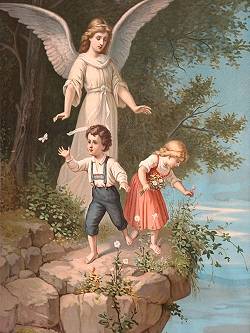
Angela is a female given name. It is derived from the Greek word ángelos (ἄγγελος), meaning angel from Greek belief systems. In the United States, the name "Angela" was at its most popular between 1965 and 1979, when it was ranked among the top 10 names for girls. Between 1922 and 2021, in the United States, the name was ranked in the top 35 names for girls.
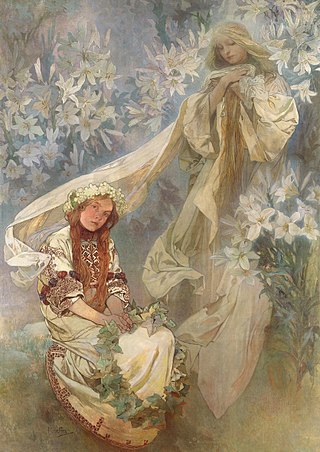
Lily is a feminine given name usually derived from lily, the flower. The name became particularly popular along with other flower names for girls during the 1800s and early 1900s. The lily also has associations with and has been symbolic of innocence and purity in Christian art. Names beginning with or containing the letter L have also been particularly fashionable for girls. It is also occasionally used as a diminutive for other names such as Elizabeth.
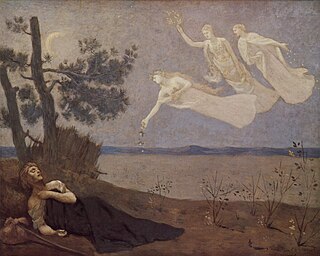
Aisling is an Irish language feminine given name meaning "dream" or "vision". It refers to an aisling, a poetic genre that developed in Irish poetry during the 17th and 18th centuries. There is no evidence that it was used as a given name before the 20th century. The name is included in Reverend Patrick Woulfe's 1923 collection of Irish names, with the comment that the name was in use in Derry and Omeath.

Poppy is a feminine given name derived from the name of the flower poppy, itself derived from the Old English popæg and referring to various species of Papaver. The name has been among the one hundred most popular names for girls in England and Wales since 1996 and among the top twenty-five names for girls since 2009. It has also recently risen in popularity in other countries in the English-speaking world, including Australia, Canada, New Zealand, and the United States. The popularity of the name coincides with increased use for girls of other flower names and names inspired by the natural world. Increased awareness of the name has also been attributed to the naming of the children of some celebrities.

Jade is a given name derived from the ornamental stone jade, which is used in artwork and in jewellery-making. The name is derived from the Spanish piedra de la ijada, which means "stone of the bowels". There was a belief that when jade was placed on the stomach, it could cure colic in babies. The stone is greatly valued in Asian countries. Confucius believed it had properties encouraging purity, bravery, and honesty. Chinese emperors were buried in suits made of the stone because they believed it would make them live on forever.
Norma is a female name. It is of Germanic and Romance origin.
Luna is a feminine given name of Latin origin, meaning moon. In Roman mythology, Luna was the divine personification of the Moon.
Brendan is an Irish masculine given name in the English language. It is derived from the Gaelic name Breandán, which is in turn derived from the earlier Old Irish Brénainn. The Old Welsh breenhin is the root of the name, meaning prince or king. The mediaeval Latin form of the name, Brendanus, has also influenced the modern English and Irish forms. Variant spellings are Brendon and Brenden. In some cases it is possible that the given name Brandon is also a variant of Brendan.

Flora is a feminine given name of Latin origin meaning flower, ultimately derived from the Latin word flos, which had the genitive florus. Flora was a fertility goddess of flowers and springtime in Ancient Rome.
Luca is a given name used predominantly for males, mainly in Latin America, Italy, Spain, Portugal, Romania. It is derived from the Latin name Lucas. It may also come from the Latin word "lucus" meaning "sacred wood". The name is common among Christians as a result of Luke the Evangelist.

Farah, or Farrah, is a feminine given name in Arabic and Persian, among other languages. Derived from the concept of Khvarenah in Zoroastrianism, it has more recently risen in popularity in the Anglosphere due to association with the American celebrities Farrah Fawcett (1947–2009) and Farrah Abraham ; the name Farrah was among the top 1,000 names for newborn girls in the United States between 1976 and 1980, between 1987 and 1988, and again between 2010 and 2016.
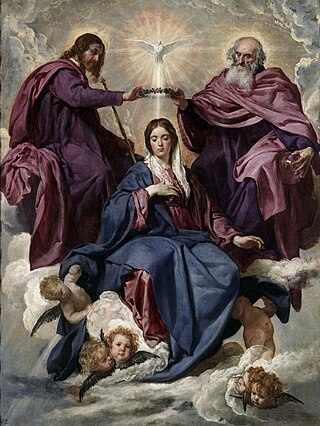
Reina, which is also spelled Raina, Rayna, or Reyna in English, is a feminine given name with multiple, unrelated origins from a number of different languages and cultures. All of these unrelated names are pronounced and written similarly in English.
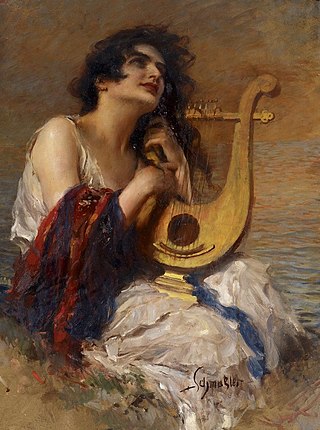
Lyra is a feminine given name of Greek and Latin origin meaning lyre. It is usually given in reference to the constellation and the Greek myth that inspired its naming. The name has associations with music and harmony and the night sky. The name has recently increased in usage due to a character in His Dark Materials, a book trilogy by Philip Pullman, and the television show and film adapted from the books.
Donya is a feminine given name, particularly in the Middle East and North Africa. In Persian "Donya" (دنیا) means "world" or "earth." It's derived from the Arabic word "dunyā," which refers to the temporal world or earthly life. In Persian literature, Donya is mentioned in the works of famous poets like Rumi and Hafez. In some Slavic countries, such as Russia and Bulgaria, "Donya" (Доня) is a diminutive form of names like "Donata" or "Donka," meaning "gift" or "generous."














